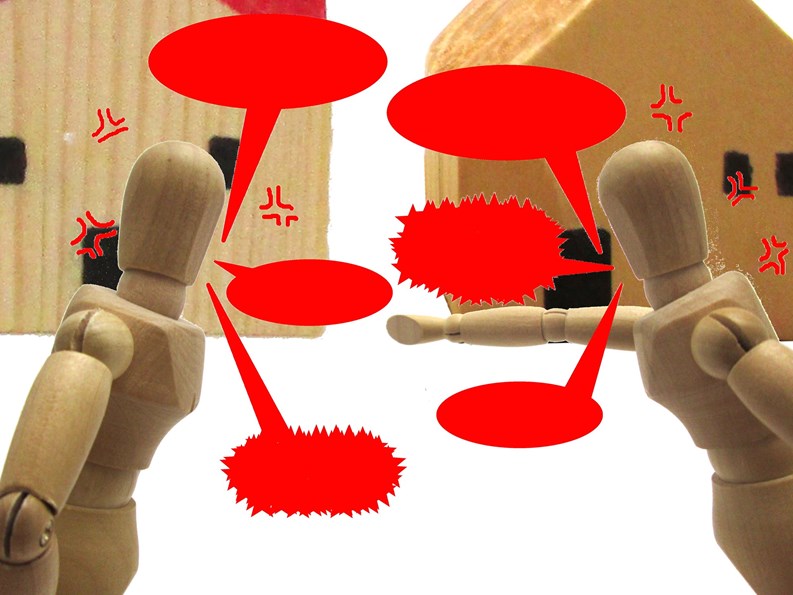It’s a fact: however harmonious a building or association is in general, there is always that one person—or perhaps more than one—who throws a wrench in the works. It could be the guy who seems to take pleasure in disrespecting the door staff, the lady who insists on dumping cigarette ashes off her balcony onto her downstairs neighbors, or the family who lets their kids play basketball inside their apartment. These are the people who—at best—regularly suck up more than their fair share of energy and resources from the community, or—at worst—create an undesirable, unhealthy, or even dangerous living situation for themselves and their neighbors.
Whether it’s for attention (even the negative kind), an expression of deep frustration and anxiety over the current state of the world, or just jerks happy to have any excuse to be themselves, it seems that more and more people are indulging in disruptive, combative behaviors—and that includes some residents of multifamily buildings and associations.
The Pandemic Factor
The pandemic of 2020-21 isn’t solely to blame for this perceived uptick in bad behavior, but it certainly played a significant role, both in terms of eroding interpersonal skills and manners, and keeping more people at home for more of the time. Rusty interpersonal skills combined with shared walls and their attendant nuisances set the stage for friction.
Jim Stoller, president and CEO of The Building Group, a property management firm based in Chicago, saw this phenomenon firsthand at the buildings his company manages, which are mostly luxury highrises in the city’s Gold Coast and other downtown neighborhoods. “There’s a lot more people working from home, so there are a lot more eyes around the building.”
While Stoller notes that “ninety percent of the people in the condos and co-ops that we manage are really wonderful,” with more people working from home, and ambient stress levels so high, “there are a lot more complaints about neighbors—the smoke complaints have gone up; complaints about people hanging out in the lobby have gone up.” In some cases, says Stoller, that tension has escalated to the point where management was compelled to involve the building’s or association’s attorneys.
One of those attorneys is Howard S. Dakoff, partner with Chicago-based law firm Levenfeld Pearlstein, LLC. He explains that complaints about neighbors must meet a “standard of reasonableness” to be considered a violation of an association’s or corporation’s governing documents, or the warranty of habitability, in the case of co-ops. “I’ve had calls from managers [saying] that a unit owner is complaining that the vacuum in the unit above them is bothering them, that they’re trying to work and they can’t work, and they’re demanding that something be done.”
This type of complaint, he says, does not meet the reasonableness standard. People are entitled to vacuum their floors, and in a multifamily setting, it’s inevitable that some noise from such activities will penetrate the walls of adjoining units. So how should a board respond?
“What I tell boards is that in this unusual time, there’s an aspect of this that’s not legal expertise, that’s not pure management skill—it’s psychology, dealing with owners with a little bit of tenderness, a little bit of empathy,” advises Dakoff. “Because everyone’s in an unusual position, and more people are home than ever before. They’re trying to work and live in a small space, in a vertical high-rise generally. And so they’re hearing things they never heard before.”
Getting Serious
While there are prescribed remedies for incidents that rise to the level of an objective violation—legal letters, fines, even eviction in extreme cases—the appropriate response to a more subjective complaint might be “a little bit of understanding and empathy,” says Dakoff. Management and the board “may be able to defuse an angry owner just by educating them.”
Such education could include reminding shareholders and owners that part of living in a co-op or condo is being a member of a community, “and also that you give up certain rights and privileges when you’re a member of a cooperative or association,” Dakoff continues. “Over the years,” he says, “we’ve had to basically tell people that if they really need total peace and quiet, that’s not going to happen in a highrise in downtown Chicago. It may just be that condominium living isn’t right for them.”
Jay Cohen, president of A. Michael Tyler Realty, a management company serving co-ops and condos in New York City, agrees. “There’s a lot of reasonable judgement that must go into responding to complaints,” he says, “and each must be dealt with on a case by case basis.” Cohen stresses that “[property] management is a people business. You have to take into account the human factor in dealing with these situations.”
Another factor that can add to the complexity of such situations in a residential setting is the fact that some perpetrators of objectionable behavior are living with an illness or disability that may cause or exacerbate that behavior. Sometimes, as in the case of hoarding, for example, the behavior itself is a symptom. In these cases, association and co-op boards must act in accordance with fair housing laws, which “prohibit housing providers (including co-ops and condos) from discriminating against protected classes, including people with disabilities,” says attorney Scott J. Sandler Jr. of Sandler & Hansen LLC, a law firm based in Middletown, Connecticut.
“Associations are typically empowered to address health and safety issues,” explains Sandler, “but the practical use of that power is limited.” In cases where mental or emotional disability is a factor, the letters and fines that are normally used to curb violations are likely to be less effective, and the protections afforded to people with disabilities can make more aggressive actions—such as eviction—fraught, if not impossible. In these situations, “The association must proceed very carefully,” continues Sandler, “because it could be accused of violating federal fair housing laws.”
Sandler goes on to suggest that owners and shareholders aggrieved by their neighbors’ behavior might be better off taking matters into their own hands, since they are not constrained by fair housing laws. “Sometimes it makes more sense for an individual owner to proceed with his or her own legal action, rather than the association doing so at the expense of the community. The governing documents of many communities contain provisions that prohibit behavior that interferes with the rights of other owners to peacefully enjoy the use of their units,” he says. “Many owners expect the association to enforce these provisions. However, these provisions are incorporated into the governing documents to provide owners with their own causes of action against a neighbor who is interfering with the peaceful enjoyment of their unit. Remind [residents] of their right to seek a legal remedy on their own behalf.”
When a violation is persistent, egregious, and goes uncured after requisite notice, then a board may have no choice but to proceed with an eviction. Managers and attorneys alike say that this is never an option to be pursued lightly, and should only take place when all other remedies have been exhausted.
The Communal Spirit
And as microcosms of the broader human condition, co-op and condo communities reflect human realities. Fear, uncertainty, and isolation drives some people to act in antisocial—even harmful—ways. But many others are driven to look for new ways of coping, helping, and reinventing. Because the communal and social aspect of living in a multifamily community is part of its appeal, its residents are more apt to reach out to neighbors, create safe community activities, and demonstrate patience and flexibility with ever-changing rules and guidance. Just like in the rest of the world, there are the outliers who disrupt, but with the right policies and professionals, co-ops and condo associations have the means to handle them.










Leave a Comment